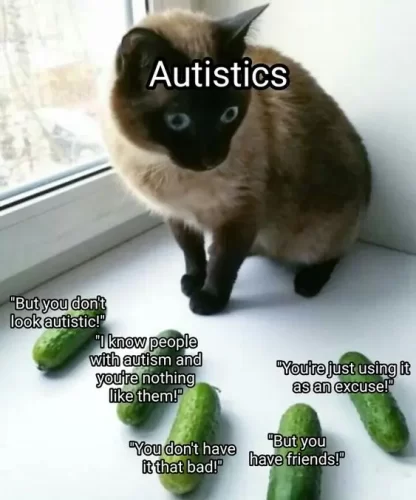Are We Overly Romanticizing Autism to the Public?
 There has been a lot of discussion lately about the representation of autism in media and popular culture.
There has been a lot of discussion lately about the representation of autism in media and popular culture.
While increasing awareness and portraying autistic individuals in a positive light is something we all want and deserve as part of dignity and respect, there are growing concerns that media and advocacy groups may be going too far in romanticizing autism spectrum disorders.
What does it mean to romanticize autism, and is raising awareness inevitably going to involve some level of putting autism in an idealized light?
These are questions worthy of careful consideration.
What Is Romanticization of Autism?
Romanticization refers to portraying being on the autism spectrum as something desirable, special, or giving someone extraordinary abilities and insights. Autism is frequently depicted through stereotypical savant characters who have genius skills in math, memory, art, or music despite struggles with social interaction and conventional communication.
Movies and TV shows often lean heavily on this savant trope when depicting autism. Think of Dustin Hoffman’s character Raymond in Rain Man meticulously counting matches and reciting dense literature. Or take The Big Bang Theory’s Sheldon Cooper, a brilliant theoretical physicist who is also deeply routine-oriented and awkward in social situations. Or the character of Dr. Shaun Murphy on The Good Doctor, a young surgeon on the spectrum with exceptional visual skills and the ability to view clinical data unusually.
While based on reality – some autistic people do have remarkable talents in specific areas like numbers, patterns, memory, or problem-solving – this is far from the universal experience of being on the spectrum. Savant abilities are quite rare, occurring in only around 1 in 200 autistic individuals, according to some researchers.
Most individuals on the autism spectrum face significant every day challenges with social communication, sensory issues, repetitive or restrictive behaviors and interests, and basic life skills like independence, employment, and self-care.
As an adult autistic, my take is that when you strive to make a good representation of autism in media—in a healthy and positive light and away from the stereotypes and negativity—you have to be careful not to go too far in the opposite direction or else you’ll end up with a different problem.
I’ve been asked whether I think I’m a savant (I’m not) and if I excel at math (I don’t). I’m also not an inventor, although I am very creative and not ruling that out entirely. It’s annoying when others seem to think that while we may have our social woes, we’re all we are all intellectual gods among humankind.
But this just isn’t true, and we need to balance these ideas in media. Autism spectrum disorder shouldn’t be either too melodramatically negative or delusionally positive. People with autism are just individuals with good qualities and flaws, just like anyone else, and society needs to realize that. And not romanticize the disorder.
LEARN MORE: Movies on Autism Need Reality Check from Media Stereotypes
The Danger of the ‘Inspirational Genius’ Romantic Stereotype
On the one hand, positive media portrayals that break down stigmas are welcome and help increase understanding and inclusion of neurodiversity. But by focusing so heavily on savant skills and special gifts, we may be perpetuating the mistaken idea that autism is almost a superpower – something that makes you extraordinary in some way.
This discounts and minimizes the very real struggles, disabilities, and difficulties that autistic individuals and their families face daily. It can set up wildly unrealistic societal expectations that people with autism spectrum disorder will be brilliant in some respected and admirable academic or creative arena like mathematics, music, or art.
The reality is that even for those on the so-called higher-functioning end of the spectrum, basic goals like independence, finding fulfilling employment, making friends, and developing meaningful relationships are monumental achievements and sources of great difficulty. It’s difficult to truly romanticize those challenges.
The inspirational savant genius stereotype can make autism seem almost trendy or desirable as a way of being “gifted” in our society’s narrow conception of what gifts matter. There is concern that this romanticizing could be damaging, by almost making autism seem appealingly edgy or counter-culture. Just as we would not glorify or put an idealized spin on other developmental disabilities like Down syndrome or intellectual disabilities, we must be very cautious about depicting autism through an uncritical rose-tinted lens.
LEARN MORE: Revealing Hidden Struggles – Top 10 Autism Challenges Explored
Viewing Autism Spectrum Disorders Through a Realistic Lens

Many on the spectrum have brilliant intellects, elite skills like programming abilities or mathematical talents, or minds that can take unconventional and innovative approaches to tackling complex issues. Neurodiversity brings cognitive differences that can be assets in certain contexts.
But it’s important to understand the whole picture – these strengths co-exist with challenges and disabilities that we cannot romanticize or ignore. Raising awareness and promoting more inclusion and accommodation for neurodiversity in schools, workplaces, and society is critical.
But perhaps even more important is accurately representing the full scope of daily life and struggles on the spectrum. Everything from sensory overload issues to difficulties with abstract reasoning, emotional regulation, and understanding social cues. Holding down jobs, navigating social relationships, and being independent with self-care and life skills, can also be difficult.
RELATED: Understanding Neurodiversity and Its Value is Key
Balanced Media Portrayals and Diverse Representation Matters
The discussion around whether some fictional portrayals romanticize autism highlights the importance of seeing a greater diversity of stories and voices reflected in media. While well-intentioned characters like Atypical’s Sam Gardner aim to increase understanding, focusing on defying odds narratives doesn’t tell the whole story.
We need authentic, multidimensional representation that captures the full scope of life on the spectrum – the disabling challenges as well as the unique strengths. Fictional accounts shouldn’t perpetuate stereotypes but illuminate the internal experience of how it feels to struggle with sensory sensitivities, social communication difficulties, emotional dysregulation, and the quest for independence. And let’s not forget being happy and having the ability to live our best life!
Importantly, media narratives should be shaped by actual autistic voices and perspectives. Too often, autism stories are still told in a way that centers the viewpoints of neurotypical parents, caregivers, or medical professionals. While these perspectives have validity, we must amplify #OwnVoices neurodivergent writers, creators, and actors to depict authentic lived experiences.
There are increasing examples of this authentic representation, like the bestselling memoir and film, The Reason I Jump by Naoki Higashida, or the writings and advocacy work of authors like Temple Grandin and John Elder Robison. The more we hear directly from autistic self-advocates and content creators (such as me!), the more we can move beyond one-dimensional stereotypes and romanticization archetypes.
RELATED: Self-Awareness Examples for Personal Growth When You Have Autism
Moving Beyond Romanticizing Autism: The Value of Real Acceptance and Accommodation
Appreciating neurodiversity and moving past stigmas and misconceptions doesn’t require putting autistic people on unrealistic pedestals. What’s most valuable is promoting true acceptance, accommodation, and improving access to evidence-based services and support across all levels of ability and the spectrum.
This means ensuring educational systems provide inclusive learning environments tailored to unique needs. It means improving pathways to meaningful employment, independent living assistance, and community integration opportunities for autistic adults.
It means more resources for families to get early intervention services, respite support, and help across the lifespan. And it means further investment into research for better understanding autism, effective communication strategies, and self-advocacy skill development.
While inspirational stories of geniuses overcoming the odds are uplifting, the reality is that an autism diagnosis brings a wide range of functional challenges that can’t be downplayed or romanticized.
According to the Autism Society, only 16% of autistic adults are employed full-time in the workforce. Around one-third are nonverbal, and almost half still struggle with remaining trapped in poverty due to lack of supports and fair opportunities. These obstacles in basic quality of life must remain the focus of advocacy efforts, policy changes, and societal acceptance.
RELATED: Individuation – Why Standing Up For Yourself is So Powerful
The Possibility of Different ‘Splendid’ Minds
In his acclaimed book Neurotribes, author Steve Silberman describes autism as one of the many “differently abled” ways of being human. He writes that while autism brings profound challenges that need robust accommodation, autistic people’s “splendid pattern” of abilities also opens up new possibilities for how we define intelligence, creativity, and personhood in our culture.
His view captures how I think we should aim to approach understanding autism. It recognizes the very real disabilities that for many individuals cause impairing struggles in daily function and basic life activities. But it also celebrates how the autistic mind’s unique patterns of strengths represent an expansion of our societal conception of human potential.
Silberman and others in fields like Disability Studies encourage society to look beyond the medicalized deficit viewpoint of neurodiversity. Instead, we should explore how enabling environments, accommodations, and new forms of human expression could allow differently-abled minds to show their brilliance in innovative ways.
This shift in perspective requires moving past stereotypes that romanticize autism to a balanced embrace of diverse human abilities across all spectrums.
In the end, raising awareness and increasing acceptance of autistic individuals is a positive step. But it’s a complex issue that demands moving past using a romanticized style of genius narratives.
True understanding comes from:
- Amplifying real experiences across all levels of ability
- Balanced media representation showing disabilities and strengths
- Investment in evidence-based support services and therapies
- Promoting inclusive communities with accommodations
- Appreciating neurodiversity as an expansion of human potential
Only then can we move past romanticizing a narrow view of autism. Instead, we can clear the way for celebrating diverse talents, abilities, and brilliant minds in all their different splendid patterns.
The Reality Beneath an Often Invisible Struggle

A key issue is that ASD doesn’t “look” a certain way. By that, I mean that we look like everyone else … or lack physical traits that identify us as having a disability (if we even choose to indicate that we do). How many individuals on the spectrum have been told, “You don’t look autistic.” (And don’t even get me started on how that insensitive comment makes me feel.)
Many autistic adolescents tragically experience isolation, depression, bullying, and being left on the outskirts. For adult autistics, around 85% are unemployed or underemployed and facing dire quality of life challenges. Over half report dealing with chronic stress, anxiety, and mood disorders.
So while heartwarming portrayals of inspiring savant characters may make for uplifting stories and positive awareness, they represent a sliver of the autism experience.
We must be so careful not to romanticize autism as something whimsical or coveted rather than an often profoundly difficult neurological condition that frequently involves disabilities and acute struggles in day-to-day life.
The sensory issues, social struggles, restrictive behaviors, and overwhelming difficulty with changes to routines and familiarity that many autistics face are not quaint personality quirks, but significantly impairing and disruptive challenges.
READ MORE: Shedding Light on Autism and Why It’s An Invisible Disability
Advocate for a Society That Welcomes Different Minds and Abilities
Ultimately, we want a world that embraces neurodiversity and appreciates the unique ways of thinking, perceiving, and experiencing life that autistic individuals have. A society that makes room for different minds and abilities and provides accommodations as well as access to evidence-based support services.
But true long-term acceptance means not romanticizing unrealistic stereotypes. It means developing a real understanding of autism as a spectrum – with both strengths and difficulties. It means creating inclusive communities and pushing for expanded resources and opportunities for people across all ability levels.
Let’s not put anyone on inspirational pedestals and romanticize their uniqueness, but instead, ensure we accommodate real needs, listen to autistic voices, and allow everyone to share their gifts, personalities, and perspectives without lofty or limiting expectations.
Additional FAQs About Autism Spectrum Disorder
If you found this question interesting, you might enjoy reading more FAQs related to autism. Also, I’d love to hear from you. Just email me at connor@myautismmind.com
- What Are 25 Common Traits of Autism Spectrum Disorder?
- What Are The Top 25 Adult Autism Spectrum Disorder Symptoms?
- Do You Know Your Flavor of Autism Spectrum Disorders?
- Behaving Badly – Is Using Autism as an Excuse Ever Okay?
- Hope for the Future: Will It Transform the Autism World?
- Is an Autism Diagnosis in Adult Age a Life Changer?
- Am I Neurodivergent? Understanding Neurodiversity and Its Value is Key
- Autism Questions: 6 FAQs You Really Want to Know
- Is Autism A Disability? Surprising Reasons for the Debate
- Alexithymia Symptoms: Is Emotional Blindness A Thing?
- Is The Absurd Plot Connecting Autism and Evolution Harmful?